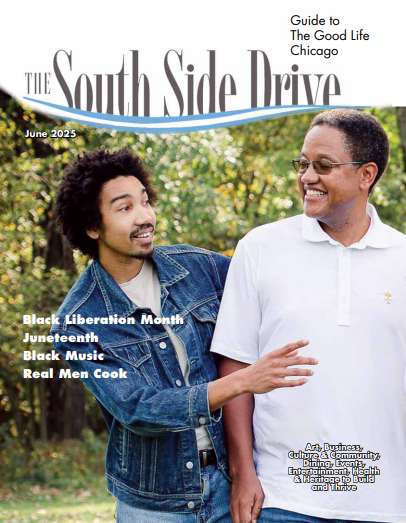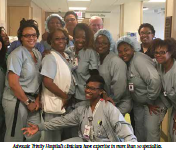We are all becoming more acutely aware of the gap in access to quality healthcare, care programs, and health education, which vary depending upon where you live in Chicago.
Residents in Streeterville have a life expectancy of 90 years, 30 years longer than residents in Englewood — due in large part to chronic health issues. Unlike those who live north of Roosevelt Road, the 600,000 South Side residents suffer a shortage of easy access to primary care, community-based specialty care programs, and supporting ambulatory and urgent care sites.
This results in inpatient admissions on the South Side being twice as high as other neighborhoods through-out the city. Likewise, emergency room visits for manage-able conditions are two to three times higher. And, South Side residents have a 10 times higher infant mortality rate and are four times more likely to die of complications from diabetes.
Three South Side healthcare providers, St. Bernard Hospital, Advocate Trinity Hospital and the University of Chicago Medicine, along with community leaders and faith leaders have joined forces to bring attention to the glaring healthcare disparities that exist on the South Side of Chicago. They’re hopeful that their new community-driven South Side Health Transformation Project will persuade the Illinois General Assembly to award them a sizeable share of $150 million that is available for healthcare trans-formation in Illinois communities facing the most severe health outcomes, healthcare access, quality, and equity challenges.
“Our mission is a more inclusive process, and to find ways to better connect our existing health organizations, increase access to care, address some of the most challenging social determinants of health and, ultimately, ensure a stronger, healthier community,” says Charles Holland, president and CEO of St. Bernard Hospital.
The South Side Health Transformation Project seeks to design new healthcare models for South Side residents that support healthy lifestyles, improve care, and reduce health disparities. Community input has been essential, as South Side residents are the primary audience for this effort. In fact, nearly 500 elected officials, faith leaders, com-munity organizations, foundations, healthcare providers, residents, and more have collaborated over the last 30 days through a series of 11 small-group listening sessions to develop a collaborative healthcare transformation plan.
Community engagement included listening sessions, a community survey, and an online portal. The responses from the community provided clear directions of what they think is needed to help create a healthy community. These six themes became the common thread: trust, wellness, representation, health education, care programs, and access.
Trust: A healthy community has doctors who develop personal, trusted relationships with their patients.
Wellness: A healthy community is a well community. Wellness is about having basic needs covered including housing, jobs, and healthy food options.
Representation: A healthy community includes care providers who are representative of and engaged with the community they serve.
Health Education: A healthy community has educational resources on illness prevention, disease management, wellness and healthy life style choices.
Care Programs: A healthy community has specific care programs designed to fit the needs of the community residents.
Access: Nearly half of the survey respondents travel outside their community for health-care services.
Reverend Julian DeShazier, Senior Pastor of University Church of Chicago and Chair of UChicago Medicine’s Community Advisory Council states: “I was honored to be a part of this very robust community engagement process. We deserve better, things MUST get better. And we don’t want to wait any longer – transformation needs to start NOW.”
Insights from the community engagement process were used to create the South Side Health Transformation Project model. The sample model includes more access to doctors, nurses, and healthcare providers in the community for both primary care and special conditions; care programs to support people with diseases or concerns common on the South Side such as behavioral health, disease management, and maternal and infant health; community health workers and care coordination to form connections between different types of care, helping people easily find the health resources and patient education they need.
Finally, technology, which is a foundational element, that will bring together healthcare providers and community health workers in support of care programs.
“Our mission is a more inclusive process, and to find ways to better connect our existing health organizations, increase access to care, address some
of the most challenging social determinants of health and, ultimately, ensure a stronger, healthier community”
Rashard Johnson, president, Advocate Trinity Hospital explains: “Our goal was to convene a community-led process where we can together determine the needs and find ways to better connect all existing South Side health organizations. Doing this enables us to increase access to care, address some of the most challenging social determinants of health, and ultimately, ensure health equity and a stronger, healthier community.”
A key part of the model is ensuring better access to care, which means that more providers – doctors, nurses, caregivers – will be connected on the South Side through a collaborative platform.
Currently, the South Side has a shortage of more than 150 primary care doctors and more than 125 specialists (doctors for special illnesses). Adding new providers and creating better access to existing providers across South Side hospitals and provider systems will reduce this problem.
The South Side Health Transformation Project model also proposes developing care programs around diseases and health concerns that are prevalent on the city’s South Side. There will be both educational and clinical programs that meet people where they are, whether in the hospital, out in the community, or at home.
Programs may focus on care for people with diabetes and high blood pressure, help with depression and other mental health conditions, or care for pregnant mothers and their babies.
Another crucial element of this comprehensive approach to healthcare is having community health workers and providers work together within care programs to help make sure that residents have what they need in order to be well – which means a combination of both treatment and wellness support.
“This is all in an effort to provide a persuasive solution to the Illinois General Assembly and establish strong criteria for allocating the $150 million in funds authorized for healthcare transformation in Illinois communities that are facing the most severe health outcomes and healthcare access, quality and equity challenges,” says Brenda Battle, Vice President, Urban Health Initiative and Chief Diversity, Inclusion and Equity Officer, University of Chicago Medicine.
For more information about the South Side Health Transformation Project or to find out how you can support the South Side Health Transformation Project, please visit southsidehealthtransformation.com.






